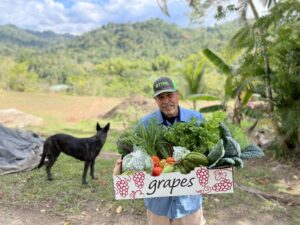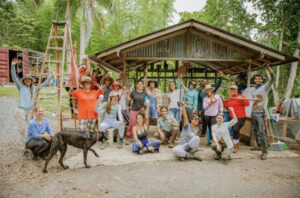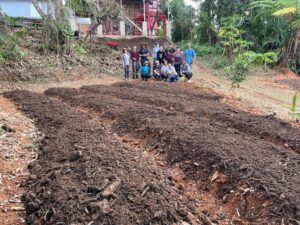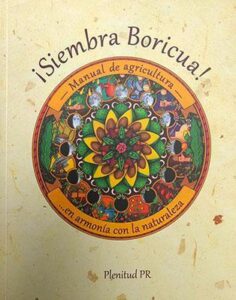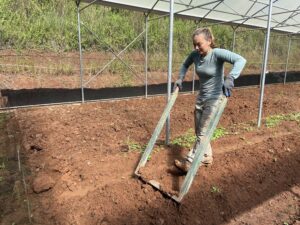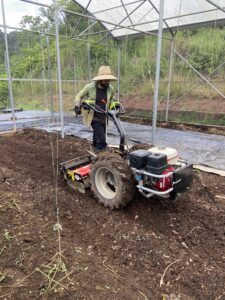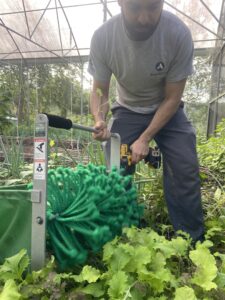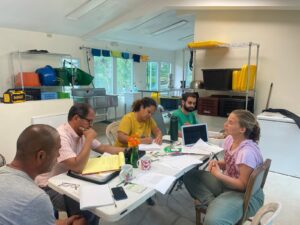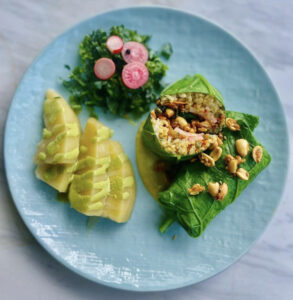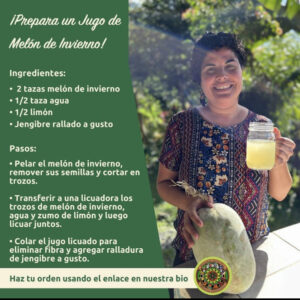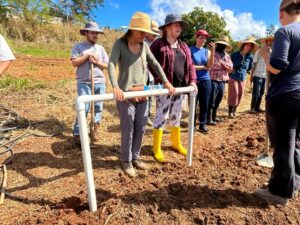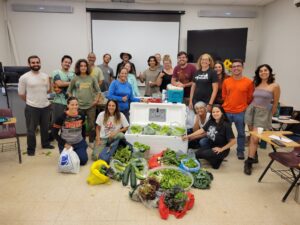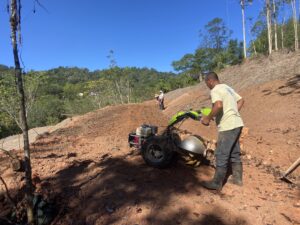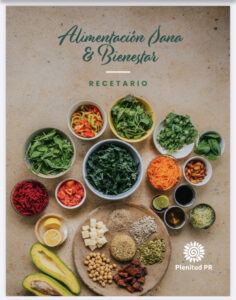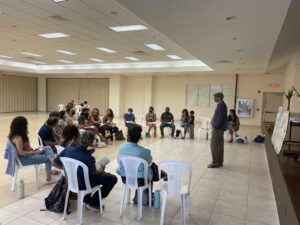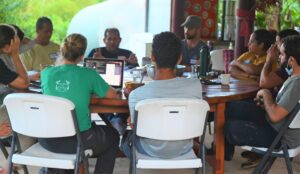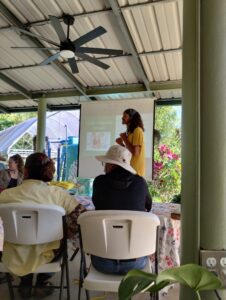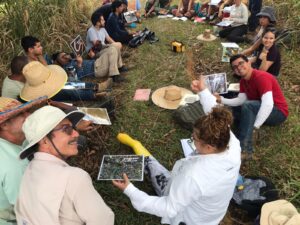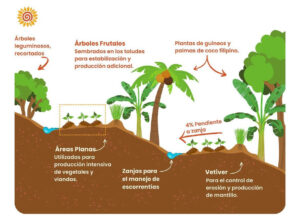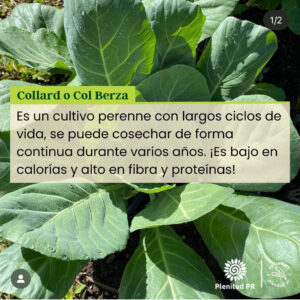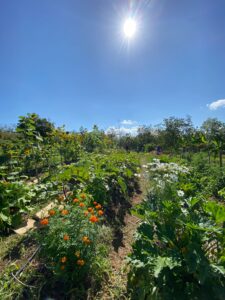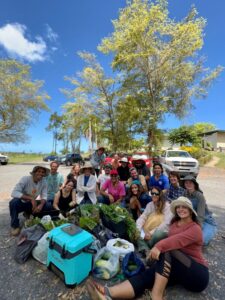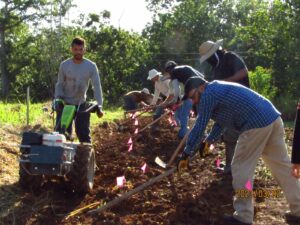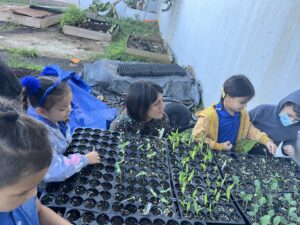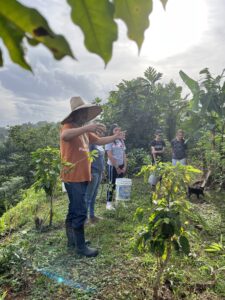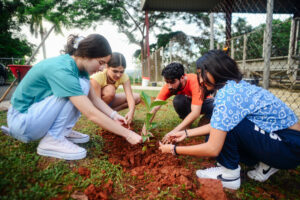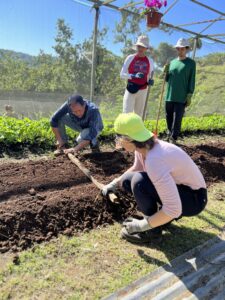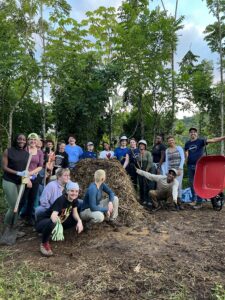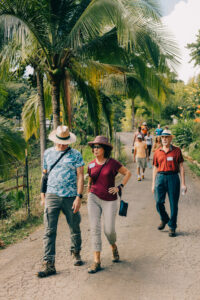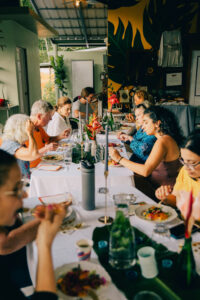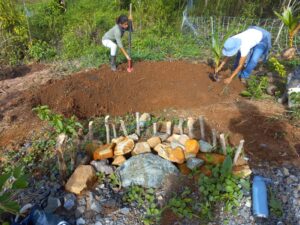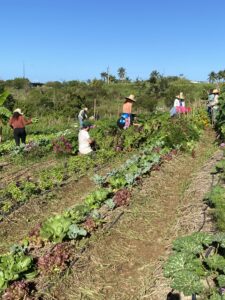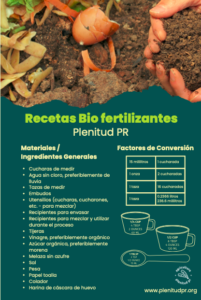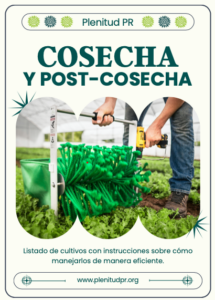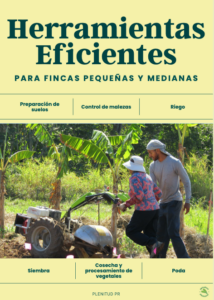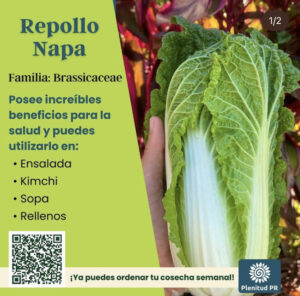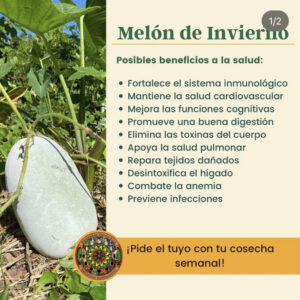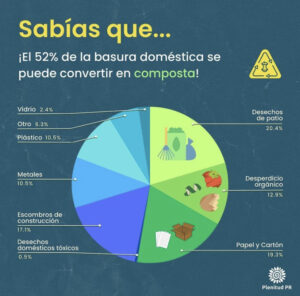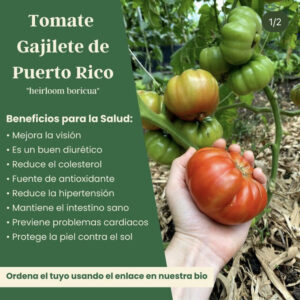Final report for EDS22-41
Project Information
In Puerto Rico, over 90% of food is imported. Furthermore, the last Puerto Rico Agriculture Census (2018) shows that the average age of farmers in our mountainous region is 60+, with most farmers utilizing conventional farming practices that degrade soil quality, increase erosion, and limit biodiversity. There is a need for a new generation of growers that can increase food security in Puerto Rico, create new livelihoods, and improve the health and quality of life for our communities. However, the complexity of the current social, political and economic climate limits opportunities to acquire resources, support and education investments to move forward. Challenges have been exacerbated by the devastation of farms and infrastructure caused by hurricanes in 2017, earthquakes in 2020, and the Covid-19 related economic crisis. The urgency and need is even greater in the marginalized and impoverished communities of the central western mountain region where Plenitud PR is located. Plenitud PR proposed a project that offers an alternative strategic model through the strengthening and expansion of experiential education training and one-on-one programs in agroecology for participants local to the central region. The team of talented agronomists, investigators, and educators involved have led educational programs impacting more than 600 aspiring/beginner farmers over the last 10 years, and have distributed over 5,000 copies of a unique Spanish-language sustainable agriculture book that serves as an educational tool for farmers and home gardeners in the tropics.
The 2020-2022 project evaluation demonstrated that:
- Small-scale sustainable farmers need more intensive mentoring, marketing resources and opportunities in order to successfully launch profitable micro-businesses.
- Consumers need more awareness on the importance of supporting local sustainable farmers and Food Access and Literacy (FAL).
This year’s project included not only a second iteration of our previous year’s educational programming (5-month apprenticeship program impacting 42 beginner farmers, a 6-month mentorship program to impacting 4 participants, and a 2-7 month internship program impacting 8 beginner farmers), but it also expanded to include an Agro-ecological Incubator for Small Businesses impacting 6 limited-resource and/or women farmers. In this program they received additional market gardening training and efficiency tools; they also gained more technical and legal support at their production sites. In this new project, small sustainable farmers were also provided stipends and resources to be able to take the time to discuss needs and collaboration opportunities and get additional technical support.
Additionally, we expanded our outreach efforts with educational material for both farmers and consumers; we have revised and expanded our current educational materials based on feedback from course participants on agricultural practices, crop planning and maintenance tools as well as developed FAL content to increase sales for farmers in the region. We also further tested and and continue to improve the second edition of our Spanish-language sustainable agriculture manual and developed better marketing and distribution systems.
Through this project, Plenitud PR sought to deepen impact on beginning farmers through programs that will increase their success and profitability, and through a multi-pronged educational and marketing campaign increasing consumer demand for local produce to advance sustainable agriculture in the region.
- Offered a 2 part 260-hr. Market Gardening Incubation experience, with the technical assistance of Voz Activa partners, to start up small scale market garden businesses or improve existing operations for 6 limited - resource and/or women farmers who have previously completed our sustainable agriculture training or are partner beginner farmers. They participated of incubation sessions with a stipend to:
- Received professional assistance and tools to prepare a crop plan and business plan
- Received technical assistance in design and infrastructure development
- Received the basic tools and materials to begin production
- Received marketing support and access to the Plenitud PR food hub as an initial or additional sales channel
- Receive financial and legal support
Here is a full report on their outcomes and growth.
- Tested and improved the second edition of our spanish sustainable agriculture book titled: !Siembra Boricua!: Manual de agricultura en armonía con la naturaleza while continuing to distribute the first edition. In the last 2 years, we tested the first edition of this book and received positive feedback on the need for this tool and its effectiveness. After making the necessary improvements and creating new tools (links in Educational and Outreach Activities section) to accompany this resource.
- Tested and trained beginning farmers with key small scale farm tools that maximize efficiency and economic viability.
Tools included:
- Two wheel tractor with implements (rotary plow, power harrow and flail mower) for easier and sustainable soil preparation.
- Broadforks for more sustainable soil preparation
- Silage tarps used for efficient weed control
- Precision seeders for quicker planting and seed saving
- Stir-up hoes for quicker and ergonomic weeding
- Flame weeder
- Greens harvester
- Crop planning templates to simplify planning and organization and intensify small growing spaces for profitability.
We created an efficiency tools resource after testing these tools for farmers and offered training opportunities on how to use them.
- Small Sustainable Farmer Collaboration Program - We incentivise 4 small scale farmer meet ups with 6 participants to initiate dialogue and collaboration. This was facilitated by our partner organization Voz Activa, who are professionals facilitating open dialogue, in order to identify needs and opportunities sharing resources and costs. We also reserved funding to catalyze collaborative projects generated from the dialogues and/or technical or legal support needed to advance their efforts. Farmers received a stipend for every gathering attended. We also organized volunteer hours at each farm during the course of the grant to support labor and deepen relationships with the farming community.
With external funding we also continued our previous year’s objectives:
- Developed Food Access and Literacy (FAL) content to increase sales for farmers in the region and improve previously created educational material based on feedback from course participants on agricultural practices, crop planning and maintenance tools. We created social media templates to present simple educational material to the general public and recipes to use with local production.
2. Continued our educational programing which includes our apprenticeship, mentorship and internship (Intensive Agroecology training).
3. Continued advancing the Plenitud PR farm operation which serves as our main laboratory and educational tool.
These lead and supported the objectives of this project to further sustainable agriculture in Puerto Rico.
Cooperators
- - Technical Advisor
- - Technical Advisor - Producer
- - Producer
- - Technical Advisor
- - Technical Advisor - Producer
- - Technical Advisor - Producer
- - Technical Advisor
Education
Our educational approach is experiential, horizontal and organized in a 3 tier system. This plan of action allows for the participants to have the opportunity to practice hands on skills for a few months and then share them with others (peer to peer), developing leadership skills at the same time.
Our 3 tiers educational model:
Tier 1 - Broader Engagement
These are one day workshops or distribution of educational material like our Agriculture book. In this way we start spreading the word about sustainable agriculture and our educational opportunities. In this tier we are able to meet people/farmers to recruit in our programs.
Tier 2 - Intensive Workshops
These are multi-day workshops as is our Agriculture Apprenticeship where students experience 5 months of practice and theory of how to develop a small scale sustainable production. They prepare and plant a field from scratch and finally get to harvest and process their produce.
Tier 3 - 1-on-1 Mentorship
These include long term 1-on-1 training experience as are our 6-month mentorship and internship and our multiyear Agro-ecological Incubator for Small Business. During these, students get to continue perfecting skills while developing their own projects with guidance of technical advisors and marketing support.
In addition our team members are constantly looking for ways to systematize and simplify tasks for farmers by creating and improving educational tools such as crop plan templates, bio-fertilizer recipe booklets, materials/supplies purchase guidelines, etc.
Regarding educational outreach, we have dedicated much efforts in creating Spanish and easy to digest sustainable agriculture educational material so distribute through social media and printed material such as a our new recipe book using local produce of small farmers.
Educational & Outreach Activities
Participation Summary:
- 106 Consultations
We worked with 6 farmers in our incubator who continually received consultations on their farming design and practices as they developed their operations. Ag professionals in our team offered over 54 consultations with the farmers. Legal and Project Design professionals from the organization Voz Activa offered over 35 consultations on legal matters of their farm businesses and how to develop their business plans. We also organized 17 work parties in the different farms.
- 47 Curricula, Factsheets or Educational Tools
We tested and improved our Annual Agroecology Apprenticeship curriculum and have completed the new versions of all the 8 topics offered. We have also completed 11 spanish educational tools including:
- Planting Guide (Seed trays, transplants and direct seeding) (Spanish)
- Maintenance Practices Guide (Spanish)
- Bio-fertilizer Recipe Booklet(spanish)
- Local Produce Recipe Book (spanish)
- Harvest and Post Harvest Guide (spanish)
- Efficiency Tools Guide (spanish)
- Crop Planning Tool (spanish)
- Budget Planning Tool(spanish)
- Sustainably grown rice video series (3 spanish videos) 1)Planting, 2)Harvest, 3)Processing
We also invested time creating social media templates to continually publish easy to understand Spanish infographics (factsheets and reels). Throughout these 2 years, we have posted over 28 sustainable agriculture posts.
3. 41 On-farm demonstrations
We organized several on farm demonstrations with student groups of different ages.
(20) Annual Agro-ecology Apprenticeship participants completing their practicum hours at our farm (Planting, Harvesting, Composting, Cover crops, Soil Prep, Seed tray Prep, etc.)
(6) Children from schools of our community (Composting, Seed tray prep, Direct seeding, Thinning)
(9) We facilitate a youth group who have started to visit our farm this year twice a month to learn and practice sustainable agriculture. They have participated of demonstrations of Composting, Transplanting, Cover Crops, Harvesting, Planting root crops, Processing Rice, Water management and Preparing foods with the fresh produce, planting trees.
(6) We received 6 service learning groups of students from universities on the US mainland. They participated in demonstrations of composting, perma-beds preparation, propagation practices, rice production, beans production, coffee production.
4. 13 Published press articles, newsletters
We have published 11 Spanish/English blogs related to sustainable agriculture and 2 newspaper articles.
11 Blogs:
https://www.plenitudpr.org/blog/mila
https://www.plenitudpr.org/blog/relationship-with-cows
https://www.plenitudpr.org/blog/agroecological-gardens
https://es.plenitudpr.org/blog/las-marias-china-duce
https://es.plenitudpr.org/blog/biofermento-de-consuelda
https://es.plenitudpr.org/blog/aprendiendo-de-los-arboles-de-aguacate
https://es.plenitudpr.org/blog/agricultores-perseverando-en-medio-de-la-crisis-climatica
https://es.plenitudpr.org/blog/convirtiendo-los-problemas-en-oportunidades-con-la-permacultura
https://www.plenitudpr.org/blog/learning-how-to-eat
https://www.plenitudpr.org/blog/giovanna-huyke-sopon
https://www.plenitudpr.org/blog/healthy-thursdays
Newspaper Articles in "El Nuevo Día"
- How to manage heat as sustainable farmers
- Importance of prioritizing local produce for sustainability
5. 20 Tours
We now offer 1 monthly educational tour to showcase our small scale sustainable farm model and offer a farm to table culinary experience.
6. 4 Webinars/ talks/ presentations
We participated in a series of virtual presentations showcasing women leaders in sustainable agriculture and also participated in a seed exchange fair where we presented our project and practices. We also participated in an interview for the Food Revolution Network to expose ways to connect consumers to farmers and local produce and finally we also participated in a panel of Environmental Leaders for High school Students.
7. 20 Workshop/Field days
We offered over 20 workshops/field days for the Annual Agro-ecology Apprenticeship. During 6 months, students had a workshop once a week in which they all participated in the planting, maintaining and harvesting of their plot while also getting college level theoretical material and discussions.
Learning Outcomes
Pest Management
Biodiversity in Puerto Rico
How to manage passive and active water, Rain Water Harvesting
Seed Management
Soil Management and conservation
How to use small scale agriculture tools and efficiency tools
Where to get sustainable agriculture supplies in Puerto Rico
Agriculture in community
Organic Matter importance, nutrient cycling, composting
Crop diversity, rotation, seasons of planting
Sense of balance and independence when able to grow their own food
Bio-fertilizers
Legal matters when developing an agribusiness
Solidarity economy and cooperative systems between small farmers
Permaculture Design
High Tunnel Production
Irrigation Systems
Business Planning
Crop Planning
Contour Planting
Project Outcomes
This project had 3 main focuses to support the growth or increase of sustainable agriculture in Puerto Rico:
- Create and improve educational material on sustainable agriculture practices for farmers that can support them in increasing efficiency and production
- Provide incubation for beginning low income farmers using sustainable practices
- Strengthen the sustainable farmer’s network in the rural west area of Puerto Rico
Regarding economic impact for farmers, the educational material as well as the incubation opportunity provided tools to be able to increase production and therefore income and we also provided funding to acquire key tools to help the farms become more productive and efficient.
As for environmental impact, by supporting farmers in using more sustainable and efficient practices and increasing their production, we are ensuring that sustainable agriculture will continue to grow and hopefully displace more and more other practices that harm the environment like the use of pesticides, other strong chemicals and practices that increase soil erosión among others.
The social benefits of this project for farmers were that they received economic and educational experience to increase production which in consequence supports them in improving their quality of life. We also gave a big push in strengthening relationships between 6 farmers that can now collaborate and share resources and sell products together, decreasing individual marketing and distribution efforts providing space for more quality of life.
|
This table includes our deliverables and served as a mechanism to monitor their progress and completion. Over 17K people were impacted through educational and outreach activities including workshops, on farm experiences, books distributed, farmer’s food hub consumers and social media posts. |
|||
|
Deliverable and Evaluation Method |
Progress |
Impact |
|
|
Main Project Activities |
|||
|
1 |
Offer 260hr Agroecological Incubator for 4 participants. Evaluation method: Keep timesheets as record and 1 report per participant of their project results and new produced documents such as: full crop plan and business plan. |
Completed |
6 participants |
|
2 |
Distribute 1,856 copies of tested and revised spanish sustainable agriculture book. |
Completed |
1856 consumers |
|
3 |
Host at least 4 gatherings with at least 5 local small producers, facilitate an open dialogue, and generate a list of specific limiting factors, identify concrete collaboration opportunities and potential projects to advance their operations. |
Completed |
6 participants |
|
4 |
Offer (2) 140hr Apprenticeships for 15-20 participants. Keep attendance, pictures and evaluation sheets measuring new knowledge acquired. |
Complete |
42 participants |
|
5 |
Offer 200hr Mentorship for 4 participants. Keep timesheets, pictures for record and report of sustainable practice learned through evaluation sheets and semi-structured interviews. |
Complete |
4 participants |
|
6 |
Offer 2-7 month internships to 8 participants. Keep timesheet, pictures for record and report of sustainable practices learned through evaluation sheets. |
Complete |
8 participant |
|
7 |
Record data of production, harvest and sales of ¼ acre market garden of Plenitud PR farm and present data in final yearly report 1 and 2. |
Complete |
150 consumers |
|
Curriculums, workshop material and User Instructions Development (Spanish) |
|||
|
8 |
Further develop, test and improve full curriculums for agroecological apprenticeship, mentorship, internship and incubator experiences that can be replicated. |
Complete |
8 presentations and workshop coordination templates |
|
9 |
Improve systems and create design and user instructions for our physical and digital food hub. |
Complete |
1 Written and 2 videos |
|
10 |
Created efficient small-scale farm tools booklet. |
Complete |
1 Tool |
|
11 |
Created or improved 6 crop planning and farm management tools templates. |
Complete |
6 Tools |
|
12 |
Create adequate harvesting practices and post-harvest processing infosheet and protocols. |
Complete |
1 Tool |
|
13 |
Created small scale business planning and farm accounting templates. |
Complete |
1 Tool |
|
Outreach, Marketing and Food Access and Literacy Materials |
|||
|
14 |
We reached over 15,000 people through social media educational posts |
In progress |
reached over 15K accounts |
|
15 |
Created 62 Spanish sustainable agriculture social media posts. |
Complete |
62 posts |
|
16 |
Created Spanish Recipe book using local sustainably grown produce. |
Complete |
1 book |
|
17 |
Created 13 blog posts highlighting local farmers and sustainable agriculture practices. |
Complete |
13 blogs |
|
18 |
Develop 2 Spanish mini-series - 1) 3 video for youtube and instagram showing key sustainable and efficient agriculture practices growing rice and 2) 11 Sustinable farmers food hub instagram videos. |
Complete |
2 series 14 videos posted |
|
19 |
Create 28 Spanish informational sheets highlighting local specialty crops, the importance of sustainable agriculture and statistics. |
Complete |
28 factsheets |
